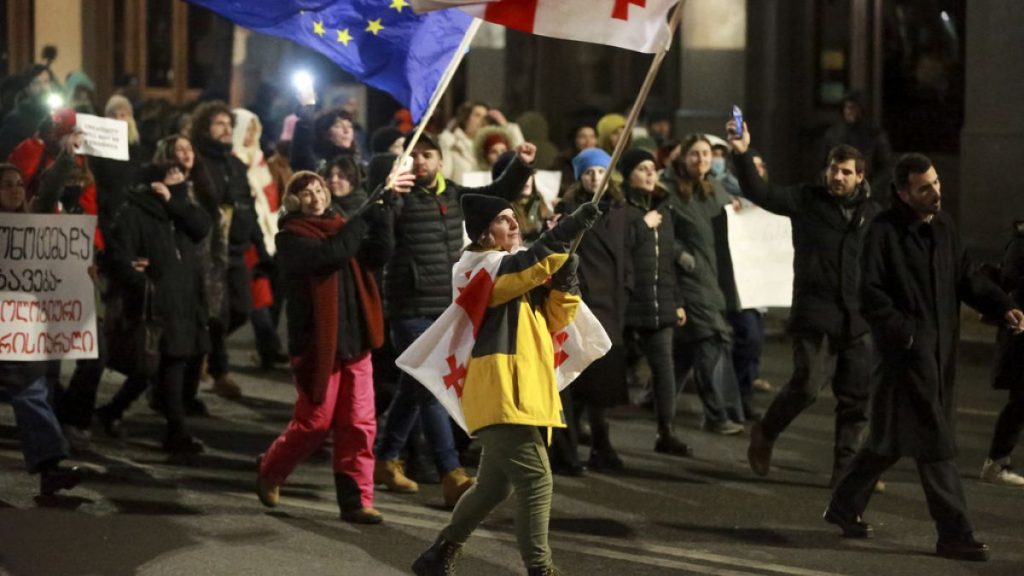Georgia stands at a critical juncture, grappling with internal political tensions and the looming shadow of its powerful neighbor, Russia. The upcoming presidential election, scheduled for Saturday, has further amplified these existing anxieties. This election marks a significant departure from previous norms, as it will be the first time the president is chosen not by popular vote but by an electoral college, a body heavily influenced by the ruling Georgian Dream party. This shift in electoral process has ignited widespread protests in the capital, Tbilisi, further exacerbating the already strained relationship between the government and its citizens. The protests, now entering their third week, reflect a deep-seated frustration with the government’s perceived pro-Russian leanings and its reluctance to pursue closer ties with the West, particularly the European Union.
The protests were initially sparked by Prime Minister Irakli Kobakhidze’s announcement that Georgia would postpone its EU accession negotiations until 2028. This decision has been met with widespread disapproval from a populace eager for closer integration with Europe and disillusioned with the government’s perceived alignment with Russia. This perception is largely fueled by the influence of Georgian Dream’s founder, Bidzina Ivanishvili, an oligarch who amassed his wealth through business dealings in Russia. The resulting suspicion of Russian influence has cast a long shadow over Georgian politics and contributed to the current unrest. The sole candidate in the upcoming presidential election, Mikheil Kavelashvili, is a member of the Georgian Dream party and is widely seen as a close ally of Ivanishvili. This perception reinforces the protesters’ concerns about the government’s direction and further fuels their demands for a new parliamentary election.
The figure of Mikheil Kavelashvili, the sole presidential candidate, adds another layer of complexity to the already volatile political landscape. A former professional footballer with a background in European leagues, Kavelashvili’s political career has been marked by his far-right stance and his association with the “People’s Power” faction within the Georgian Dream party, a group known for its anti-Western sentiments. This alignment with the far-right and his perceived subservience to Ivanishvili has further alienated segments of the population, particularly those who aspire to closer ties with Europe and embrace Western values. Protesters view Kavelashvili as a “puppet” of Ivanishvili, a symbol of the ruling party’s grip on power and its perceived disregard for the will of the people. While Ivanishvili has praised Kavelashvili as the “embodiment of a Georgian man,” this endorsement has done little to assuage the concerns of those who see him as a threat to Georgia’s democratic aspirations.
The contrasting sentiments prevalent in different parts of the country highlight the deep divisions within Georgian society. While Tbilisi is gripped by anti-government protests and pro-Western aspirations, the regions bordering the Russian-occupied territories, particularly South Ossetia, harbor different perspectives. The residents of these areas, scarred by the memories of past conflicts with Russia, including the 1991-1992 war and the 2008 Russian invasion, are more inclined towards a cautious approach towards Moscow. The proximity to Russian forces and the continued encroachment on Georgian territory creates a palpable sense of vulnerability, prompting many to prioritize stability and avoid actions that might provoke their powerful neighbor. This divergence in perspectives underscores the complexities of Georgia’s geopolitical predicament and the challenges facing its leaders as they navigate the delicate balance between national sovereignty and regional stability.
The fear of Russian reprisal is a powerful undercurrent in Georgian politics, shaping the actions of both the government and the populace. The ongoing conflict in Ukraine serves as a stark reminder of Russia’s willingness to use military force to assert its influence in the region. This fear is particularly acute in the regions bordering the breakaway republics of Abkhazia and South Ossetia, where Russian troops maintain a significant presence. The memory of the 2008 war, which resulted in the loss of territory and the displacement of thousands of Georgians, continues to haunt the collective consciousness. This historical baggage, coupled with the current geopolitical realities, creates a climate of apprehension and fuels the desire for a more conciliatory approach towards Russia.
The current political crisis in Georgia epitomizes the complex interplay of internal political dynamics and external geopolitical pressures. The country is caught between its aspirations for closer integration with the West and the pragmatic need to maintain a delicate balance with Russia, a powerful neighbor with a history of intervention in Georgian affairs. The upcoming presidential election, conducted under the shadow of protests and accusations of Russian influence, will undoubtedly shape the course of Georgia’s future. The outcome of this election and the government’s response to the ongoing protests will be crucial in determining whether Georgia can navigate this precarious path and preserve its sovereignty while pursuing its democratic aspirations. The challenge for Georgia is to find a way to reconcile its desire for closer ties with the West with the need to manage its relationship with Russia, a formidable neighbor whose influence continues to loom large over the country’s political landscape.

